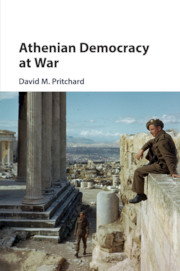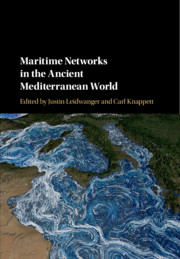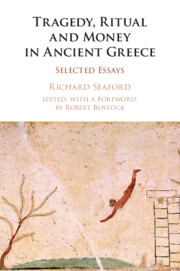Refine search
Actions for selected content:
23990 results in Ancient history
Figures
-
- Book:
- Maritime Networks in the Ancient Mediterranean World
- Published online:
- 05 November 2018
- Print publication:
- 22 November 2018, pp vii-ix
-
- Chapter
- Export citation
6 - The Late Fifth Century, 455–493
-
- Book:
- The Roman Empire in Late Antiquity
- Published online:
- 29 October 2019
- Print publication:
- 22 November 2018, pp 195-223
-
- Chapter
- Export citation
Preface
-
- Book:
- Maritime Networks in the Ancient Mediterranean World
- Published online:
- 05 November 2018
- Print publication:
- 22 November 2018, pp xiii-xiv
-
- Chapter
- Export citation
Chapter 1 - Homeric and Tragic Sacrifice
- from Part I - Tragedy: General
-
- Book:
- Tragedy, Ritual and Money in Ancient Greece
- Published online:
- 02 November 2018
- Print publication:
- 22 November 2018, pp 3-14
-
- Chapter
- Export citation
Chapter 20 - Form and Money in Wagner’s Ring and Aeschylean Tragedy
- from Part VIII - Money and Modernity
-
- Book:
- Tragedy, Ritual and Money in Ancient Greece
- Published online:
- 02 November 2018
- Print publication:
- 22 November 2018, pp 421-432
-
- Chapter
- Export citation
Copyright page
-
- Book:
- Tragedy, Ritual and Money in Ancient Greece
- Published online:
- 02 November 2018
- Print publication:
- 22 November 2018, pp iv-iv
-
- Chapter
- Export citation
11 - The Reign of Heraclius, 610–641
-
- Book:
- The Roman Empire in Late Antiquity
- Published online:
- 29 October 2019
- Print publication:
- 22 November 2018, pp 331-350
-
- Chapter
- Export citation
Chapter 12 - The Destruction of Limits in Sophocles’ Electra
- from Part III - Tragedy and Death Ritual
-
- Book:
- Tragedy, Ritual and Money in Ancient Greece
- Published online:
- 02 November 2018
- Print publication:
- 22 November 2018, pp 242-254
-
- Chapter
- Export citation
Contributors
-
- Book:
- Maritime Networks in the Ancient Mediterranean World
- Published online:
- 05 November 2018
- Print publication:
- 22 November 2018, pp xi-xii
-
- Chapter
- Export citation
Part I - Tragedy: General
-
- Book:
- Tragedy, Ritual and Money in Ancient Greece
- Published online:
- 02 November 2018
- Print publication:
- 22 November 2018, pp 1-142
-
- Chapter
- Export citation
Glossary
-
- Book:
- The Roman Empire in Late Antiquity
- Published online:
- 29 October 2019
- Print publication:
- 22 November 2018, pp 353-358
-
- Chapter
- Export citation
Introduction
-
- Book:
- The Roman Empire in Late Antiquity
- Published online:
- 29 October 2019
- Print publication:
- 22 November 2018, pp 1-4
-
- Chapter
- Export citation
Part VII - India and Greece
-
- Book:
- Tragedy, Ritual and Money in Ancient Greece
- Published online:
- 02 November 2018
- Print publication:
- 22 November 2018, pp 379-418
-
- Chapter
- Export citation
Chapter 18 - The Fluttering Soul
- from Part VI - The Inner Self
-
- Book:
- Tragedy, Ritual and Money in Ancient Greece
- Published online:
- 02 November 2018
- Print publication:
- 22 November 2018, pp 370-378
-
- Chapter
- Export citation
Chapter 8 - The Politics of the Mystic Chorus
- from Part II - Performance and the Mysteries
-
- Book:
- Tragedy, Ritual and Money in Ancient Greece
- Published online:
- 02 November 2018
- Print publication:
- 22 November 2018, pp 165-185
-
- Chapter
- Export citation

Athenian Democracy at War
-
- Published online:
- 08 November 2018
- Print publication:
- 29 November 2018

Maritime Networks in the Ancient Mediterranean World
-
- Published online:
- 05 November 2018
- Print publication:
- 22 November 2018

Tragedy, Ritual and Money in Ancient Greece
- Selected Essays
-
- Published online:
- 02 November 2018
- Print publication:
- 22 November 2018
Part 3 - Dionysius and Augustan Rome
-
- Book:
- Dionysius of Halicarnassus and Augustan Rome
- Published online:
- 12 October 2018
- Print publication:
- 01 November 2018, pp 201-266
-
- Chapter
- Export citation
Chapter 8 - Dionysius on Regime Change
- from Part 3 - Dionysius and Augustan Rome
-
-
- Book:
- Dionysius of Halicarnassus and Augustan Rome
- Published online:
- 12 October 2018
- Print publication:
- 01 November 2018, pp 203-220
-
- Chapter
- Export citation
